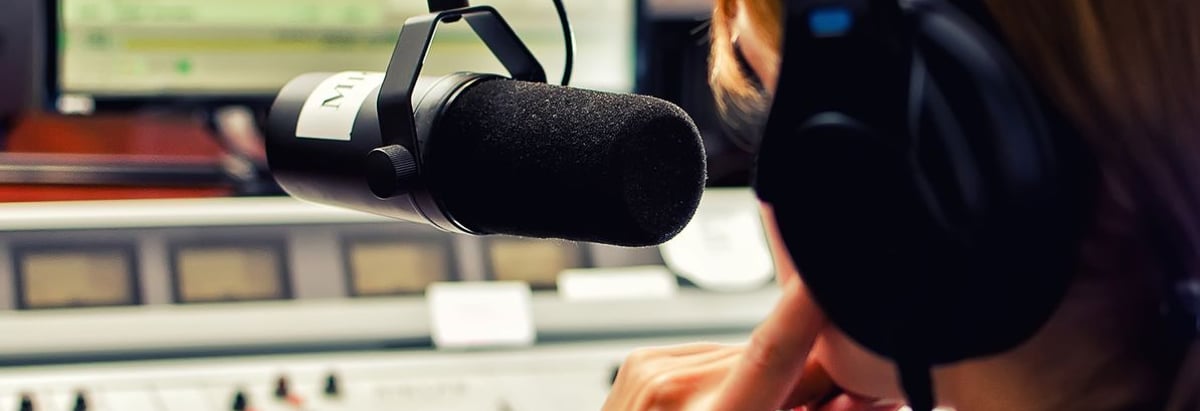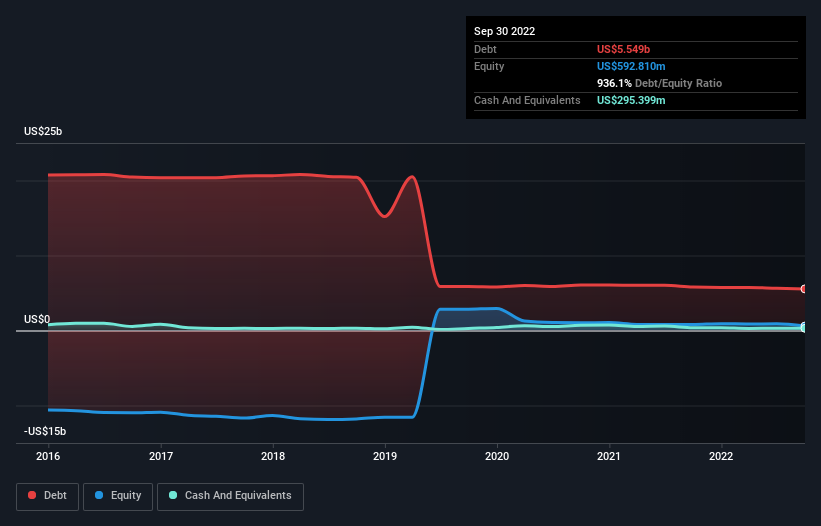- United States
- /
- Media
- /
- NasdaqGS:IHRT
These 4 Measures Indicate That iHeartMedia (NASDAQ:IHRT) Is Using Debt Extensively

Howard Marks put it nicely when he said that, rather than worrying about share price volatility, 'The possibility of permanent loss is the risk I worry about... and every practical investor I know worries about.' It's only natural to consider a company's balance sheet when you examine how risky it is, since debt is often involved when a business collapses. As with many other companies iHeartMedia, Inc. (NASDAQ:IHRT) makes use of debt. But should shareholders be worried about its use of debt?
Why Does Debt Bring Risk?
Debt assists a business until the business has trouble paying it off, either with new capital or with free cash flow. In the worst case scenario, a company can go bankrupt if it cannot pay its creditors. However, a more common (but still painful) scenario is that it has to raise new equity capital at a low price, thus permanently diluting shareholders. Having said that, the most common situation is where a company manages its debt reasonably well - and to its own advantage. When we examine debt levels, we first consider both cash and debt levels, together.
Check out our latest analysis for iHeartMedia
How Much Debt Does iHeartMedia Carry?
You can click the graphic below for the historical numbers, but it shows that iHeartMedia had US$5.55b of debt in September 2022, down from US$5.79b, one year before. On the flip side, it has US$295.4m in cash leading to net debt of about US$5.25b.

How Healthy Is iHeartMedia's Balance Sheet?
We can see from the most recent balance sheet that iHeartMedia had liabilities of US$740.0m falling due within a year, and liabilities of US$7.00b due beyond that. Offsetting this, it had US$295.4m in cash and US$981.1m in receivables that were due within 12 months. So its liabilities total US$6.46b more than the combination of its cash and short-term receivables.
This deficit casts a shadow over the US$1.10b company, like a colossus towering over mere mortals. So we'd watch its balance sheet closely, without a doubt. After all, iHeartMedia would likely require a major re-capitalisation if it had to pay its creditors today.
In order to size up a company's debt relative to its earnings, we calculate its net debt divided by its earnings before interest, tax, depreciation, and amortization (EBITDA) and its earnings before interest and tax (EBIT) divided by its interest expense (its interest cover). Thus we consider debt relative to earnings both with and without depreciation and amortization expenses.
Weak interest cover of 1.1 times and a disturbingly high net debt to EBITDA ratio of 6.4 hit our confidence in iHeartMedia like a one-two punch to the gut. The debt burden here is substantial. The good news is that iHeartMedia grew its EBIT a smooth 55% over the last twelve months. Like the milk of human kindness that sort of growth increases resilience, making the company more capable of managing debt. When analysing debt levels, the balance sheet is the obvious place to start. But it is future earnings, more than anything, that will determine iHeartMedia's ability to maintain a healthy balance sheet going forward. So if you're focused on the future you can check out this free report showing analyst profit forecasts.
But our final consideration is also important, because a company cannot pay debt with paper profits; it needs cold hard cash. So it's worth checking how much of that EBIT is backed by free cash flow. During the last three years, iHeartMedia generated free cash flow amounting to a very robust 87% of its EBIT, more than we'd expect. That puts it in a very strong position to pay down debt.
Our View
To be frank both iHeartMedia's interest cover and its track record of staying on top of its total liabilities make us rather uncomfortable with its debt levels. But at least it's pretty decent at converting EBIT to free cash flow; that's encouraging. Once we consider all the factors above, together, it seems to us that iHeartMedia's debt is making it a bit risky. Some people like that sort of risk, but we're mindful of the potential pitfalls, so we'd probably prefer it carry less debt. When analysing debt levels, the balance sheet is the obvious place to start. But ultimately, every company can contain risks that exist outside of the balance sheet. Case in point: We've spotted 1 warning sign for iHeartMedia you should be aware of.
If, after all that, you're more interested in a fast growing company with a rock-solid balance sheet, then check out our list of net cash growth stocks without delay.
Valuation is complex, but we're here to simplify it.
Discover if iHeartMedia might be undervalued or overvalued with our detailed analysis, featuring fair value estimates, potential risks, dividends, insider trades, and its financial condition.
Access Free AnalysisHave feedback on this article? Concerned about the content? Get in touch with us directly. Alternatively, email editorial-team (at) simplywallst.com.
This article by Simply Wall St is general in nature. We provide commentary based on historical data and analyst forecasts only using an unbiased methodology and our articles are not intended to be financial advice. It does not constitute a recommendation to buy or sell any stock, and does not take account of your objectives, or your financial situation. We aim to bring you long-term focused analysis driven by fundamental data. Note that our analysis may not factor in the latest price-sensitive company announcements or qualitative material. Simply Wall St has no position in any stocks mentioned.
About NasdaqGS:IHRT
Undervalued with moderate growth potential.
Similar Companies
Market Insights
Community Narratives



